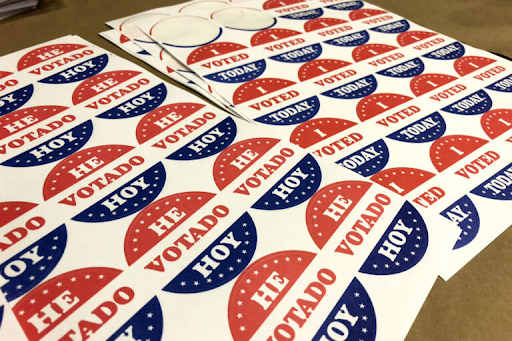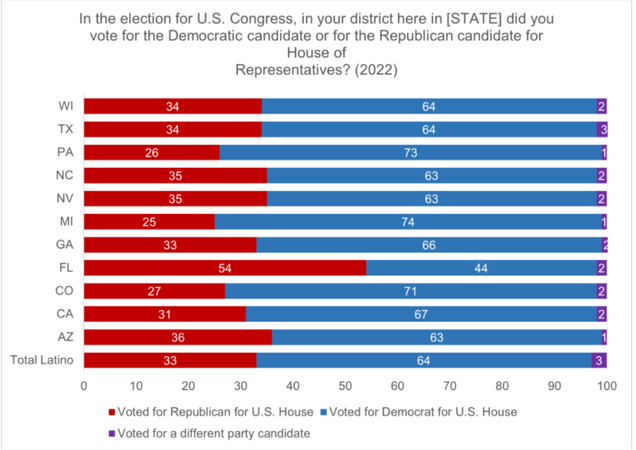The Latino Vote is Not a Monolith
Nayeli Quiles
Instructor’s Introduction
Our section of WR120, Sí se puede: Latinx Culture in the Contemporary US, debuted in the fall of 2022. In this course we explored the construction of Latinidad and how it is represented in literature and media. The course culminated in collaborative student research into issues that impact Latino communities such as immigration, gentrification, higher education, public health, and political representation. I like to let students investigate topics of their own interest that intersect with their other courses or extracurricular involvements. Nayeli’s group chose to present on the Latino vote, an issue that has received much attention in the press. She used this research for the third paper, which was an alternative genre paper, as she chose to write an op/ed piece about how both the Democratic and Republican parties fail to understand and recognize the diversity of Latinos as voters, thereby risking the alienation of a growing part of the voting population. At a moment in which interest in politics is incredibly high, Nayeli’s essay enters into an important debate, one that might even swing elections if heeded by the political establishment. I am eager to see where Nayeli’s interest and knowledge of political analysis lead her. Voices like hers in politics and the media would contribute to a more nuanced understanding of the complexities of Latinx peoples and communities in the US.
Nayeli’s essay makes use of contemporary journalistic writing strategies, as it effectively employs images, graphs, charts, and hyperlinks. As a teaching resource, it serves as a great model for op/ed essays, which are an increasingly popular genre in Writing Program courses.
Molly Monet-Viera
From the Writer
As a lifelong resident of Boston with Puerto Rican roots, my cultural upbringing greatly influenced my decision to tackle the topic of the Latinx electorate in my essay. In approaching this topic through the op-ed style, I was able to examine the controversial dialogue surrounding Latinos during the 2022 midterm elections from multiple perspectives, and offer potential solutions going forward. I appreciate the flexibility in stylistic approaches that op-eds provide, and have since incorporated the writing style into my work in other classes.
The Latino Vote is Not a Monolith

In the aftermath of the 2022 midterm elections, the Latino vote is under a heightened level of observation, following the shift among some Latinos to vote Republican. As an ever-growing percentage of the U.S population, making up a total of 19% as of 2022, there has been a recent focus on gaining the “Latino vote” as a whole, since their significant numbers can greatly impact the tide of congressional, presidential and local elections.
However, Latinos have shown in recent years that while there is an overall trend to vote Democrat, the voting bloc by no means is unified. Gender, state of residence, age, economic status, as well as country of origin all have an impact on how an individual votes. However, that can be said for any major voting block in the US, as a person’s intersectional identities will always inform how they vote. So why is the Latino vote under a new degree of observation? Well it may have to do with the fact that since 2018, the share of Latinos who vote Democrat has decreased slightly, and Republicans have been able to gain some of these voters. Yet, the so-called “red wave” that Republicans predicted for both their party and Hispanic voters during the midterm elections, could be more compared to a ripple in the water.
A 2022 exit poll from the African American Research Collaborative (AARC) showed that while on average 64% of Latinos voted Democrat, and 33% voted Republican, there was state-to-state variance, especially in Florida. Florida is unique in its Latino voting population, as there is a concerted effort by the Republican party to pull in Latino voters with rhetoric oftentimes comparing Democratic leaders with some Latin American socialists, which enables them to convince more recent immigrants to vote conservatively. However, as the data clearly displays, Florida is an outlier, as there is no dramatic change among the Latino vote on the side of the Republicans. In fact, the Latino vote, specifically among young voters, was vital in some battleground races for senate control, such as in Nevada, where Democratic U.S. Sen. Catherine Cortez Masto narrowly maintained her senate seat. On the other side of the country, Democrat John Fetterman, running against Mehmet Oz, won with 68% of the Latino vote.

In the current political landscape, where immigrants, specifically from south of the border, are frequently the target of Republican fear mongering and racist rhetoric, the question then arises why some Latinos are beginning to shift their political ideology more toward the right.
One of the push factors may very well be that the Democratic party views Latinos as a monolith, and thus does not specifically campaign for issues that for example, Puerto Ricans, Mexicans or Dominicans might be concerned with. Nor do they distinguish between the generational gap between immigrants and their children, who could potentially have very different views on policy. Treating the community as one only isolates people who may not feel as though they are represented, and therefore turn to a different party, or simply not vote at all.

Another reason for the slight shift among Latino voters can also be attributed to the language and messaging from both parties. For immigrants from Cuba and Venezuela, Republican language referring to certain Democratic policies as “socialist” or part of the “radical left” serve as functional deterrents for voting blue, when for many they had fled a country with policies of the same name.
Nonetheless, there is still a reason that the majority of Latino voters vote Democrat. According to a 2022 Pew Research Survey, more than half of Latinos believe that the Democratic party represents their interests more, and “really cares about [them]”, as compared to the Republican party. Key policy issues such as immigration, health care, reproductive rights and climate change are also at the focal point of a more left-leaning Latino vote.
In order for Democrats to maintain the Latino vote, there must be a concentrated effort on outreach. The problem arises when Latinos are only brought up during election cycles, or during Hispanic Heritage month. We don’t disappear the other 11 months out of the year. Within political campaigns, there must be greater inclusion of Spanish language materials to inform voters of upcoming elections and candidates in order to have a truly informed voting populace. No voting block should be used as a political prop, which is too often the reality, not just for Latinos.
It is unfortunately a part of the nature of politics for a party to appeal to what will draw people into the voting booth, whether or not it is followed through on. If Democrats and Republicans alike want to see a more steady support amongst Latinos or other key voting blocs, they will need to remain consistent on their political promises and aim to execute them. The Latino vote will only continue to grow in power, especially as every 30 seconds, a Latino becomes eligible to vote.
In 2022 there should no longer be a level of mystique surrounding how Latinos vote, as there is sufficient data illustrating the groups dynamic voting behavior, and distinct political ideologies. Yearly shifts among voters should be expected. Just as the national support for Democrats in congressional and presidential elections has ebbed and flowed over the last few decades, the same should be expected of the Latino vote.
Nayeli Quiles is a freshman in the College of Arts and Sciences at Boston University, majoring in Political Science and minoring in Sociology. In her free time you can find Nayeli catching up on the latest thriller or romcom book releases. She would like to thank Professor Monet-Viera for her help in the writing process.